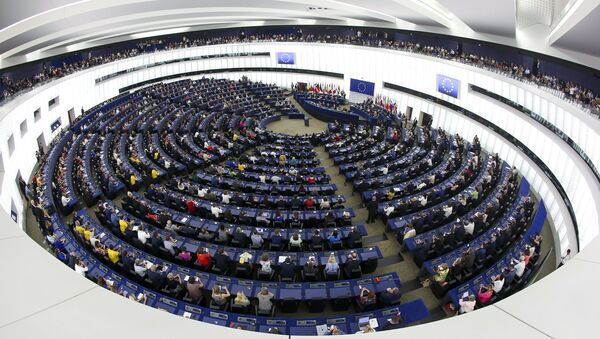The European Parliament should be careful and cautious about taking up the six resolutions - five against and one in favour - with regard to the contentious Citizenship Amendment Act (CAA) granting citizenship to persecuted non-Muslim immigrants from Pakistan, Bangladesh, and Afghanistan who came to India before 1 January 2015, Indian analysts said on Monday.
“Obviously, this is not a very positive sign for Indo-EU relations. Prime Minister Modi is scheduled to visit Brussels for the EU-India Summit on 13 March. Both India and the EU have had good ties for the last two years", Dr Gulshan Sachdeva, a professor at the Centre for European Studies at Jawaharlal Nehru University said.
“We have seen new High Representatives (HRs) of the EU and European Council (EC) representatives undertaking visits to India. So in a sense, debating and discussing these critical resolutions could derail ties", he added.
He further said that political groupings in the European Parliament putting forward critical resolutions related to India is a quite a serious development.
According to India’s former envoy to Italy and Qatar K.P. Fabian, the Indian government, especially Prime Minister Modi, is coming under increasing scrutiny and getting bad press, much beyond the levels anticipated by the Indian Foreign Office.
“The argument that the CAA is an internal matter might be correct, but it is being rejected. There is no point in being correct if you cannot carry conviction. It is better to take corrective action sooner rather than later, as with more delay the cost goes up", he said.
Stating that India and the European Union share a comprehensive and dynamic relationship based on democratic values and norms, Dr Dinoj Kumar Upadhyay, Research Fellow (European Affairs) at the New Delhi-based think tank Indian Council of World Affairs (ICWA), said: “Evolving regional and global scenarios warrant greater policy synergies between them. It seems that such resolutions are unlikely to affect their growing multifaceted partnership in the long term".
On Sunday, five key European Parliament groupings moved separate critical resolutions against the contentious Citizenship (Amendment) Act (CAA) passed by the Indian Parliament on 12 December 2019. Two of them described the CAA as marking a “dangerous shift” in the way citizenship will be determined and expressed deep regret over it being made a law in India.
The European People’s Party (PPE), a centre-right group with 182 MEPs, said the CAA “is selective and excludes Muslims” and warned New Delhi about the negative impact to its international image as well as on internal stability.
The centre-left Progressive Alliance of Socialists and Democrats (S and D Group), the European Parliament’s second-largest with 154 MEPs, described the CAA as being “explicitly discriminatory in nature”. It denounced the application of religious criteria in India’s naturalisation and refugee policies and urged the latter to “operate in line with international fair trial standards”.
Indian government sources said: “We hope the sponsors and supporters of the draft will engage with us to get a full and accurate assessment of the facts before they proceed further. As fellow democracies, the EU Parliament should not take actions that call into question the rights and authority of democratically elected legislatures in other regions of the world".
Professor Sachdeva said: “We have to see the exact wording of the statement that will come out after these resolutions are taken up for discussion and debate later this week. We need to see how the Indian government reacts. If the resolutions and the statement issued by the EU thereafter are very critical, it will impact ties with India".
Over nearly eight weeks, protests have raged across cities against the newly created citizenship law. Some of these agitations held across the country, have turned violent, resulting in clashes and acts of vandalism, leaving over 20 people dead and hundreds of others injured.
The law grants Indian citizenship to non-Muslim immigrants who fled persecution in Afghanistan, Pakistan, and Bangladesh, and who settled in India on or before 31 December 2014.
It has evoked protests particularly from the Muslim community, which feels new legislation ignores and discriminates against them.
India’s opposition parties, civil rights activists, and students have alleged that the law violates the secular ideals enshrined in the country’s Constitution. Prime Minister Narendra Modi, however, has clarified that Muslims settled in India have nothing to worry about as the law “seeks to grant citizenship, not snatch it".




